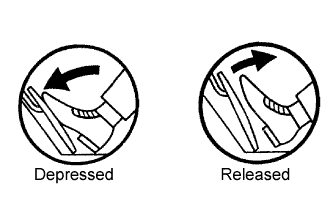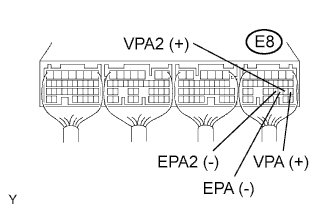Dtc P2121/19 Throttle / Pedal Position Sensor / Switch D Circuit Range / Performance
DESCRIPTION
MONITOR DESCRIPTION
FAIL-SAFE
WIRING DIAGRAM
INSPECTION PROCEDURE
When using intelligent tester:
READ DATA LIST (ACCELERATOR POSITION NO. 1, ACCELERATOR POSITION NO. 2)
CHECK HARNESS AND CONNECTOR (ACCELERATOR PEDAL POSITION SENSOR - ECM)
When not using intelligent tester:
CHECK ECM (VPA, VPA2 VOLTAGE)
CHECK HARNESS AND CONNECTOR (ACCELERATOR PEDAL POSITION SENSOR - ECM)
DTC P2121/19 Throttle / Pedal Position Sensor / Switch "D" Circuit Range / Performance |
DESCRIPTION
- HINT:
- This DTC is related to the accelerator pedal position sensor.
Refer to DTC P2120/19 (Toyota Fortuner RM000000ZQR00LX_01.html). DTC No.
| DTC Detection Condition
| Trouble Area
|
P2121/19
| Either of following conditions 1 or 2 met for 0.5 seconds (1 trip detection logic)
- Difference between VPA and VPA2 is less than 0.4 V, or more than 1.2 V. (learned value of accelerator off position)
- Difference between VPA and VPA2 is more than or equal to the specified value.
| - Accelerator pedal position sensor circuit
- Accelerator pedal position sensor
- ECM
|
MONITOR DESCRIPTION
When the difference between voltage outputs of VPA1 and VPA2 deviates from the standard range, the ECM concludes that there is a defect in the accelerator pedal position (APP) sensor. The ECM illuminates the MIL and sets the DTC.This monitor runs for 1 second (the first second of engine idle) after the engine is started.
FAIL-SAFE
The accelerator pedal position sensor has a main circuit and associated circuit. When one circuit is malfunctioning, the accelerator pedal position is calculated by the output of the other circuit. When both of the circuits are malfunctioning, it is interpreted that the accelerator pedal is released. As a result, throttle valve is closed and engine idles.
WIRING DIAGRAM
Refer to DTC P2120/19 (Toyota Fortuner RM000000ZQR00LX_04.html).
INSPECTION PROCEDURE
- HINT:
- Read freeze frame data using the intelligent tester. Freeze frame data records the engine conditions when malfunctions are detected. When troubleshooting, freeze frame data can help determine if the vehicle was moving or stationary, if the engine was warmed up or not, if the air-fuel ratio was lean or rich, and other data from the time the malfunction occurred.
When using intelligent tester:
| 1.READ DATA LIST (ACCELERATOR POSITION NO. 1, ACCELERATOR POSITION NO. 2) |
Connect the intelligent tester to the DLC3.
Turn the ignition switch ON and turn the intelligent tester ON.
Enter the following menus: Powertrain / Engine and ECT / Data List / Accelerator Position No. 1 and Accelerator Position No. 2.
Read the values.
- Standard voltage:
Accelerator Pedal
| Accelerator Position No. 1
| Accelerator Position No. 2
|
Released
| 0.5 to 1.1 V
| 1.2 to 2.0 V
|
Depressed
| 2.6 to 4.5 V
| 3.4 to 5.0 V
|
| 2.CHECK HARNESS AND CONNECTOR (ACCELERATOR PEDAL POSITION SENSOR - ECM) |
Disconnect the A22 accelerator pedal position sensor connector.
Disconnect the E8 ECM connector.
Measure the resistance of the wire harness side connectors.
- Standard resistance:
Tester Connection
| Specified Condition
|
A22-6 (VPA) - E8-18 (VPA)
| Below 1 Ω
|
A22-5 (EPA) - E8-20 (EPA)
| Below 1 Ω
|
A22-4 (VCPA) - E8-26 (VCPA)
| Below 1 Ω
|
A22-3 (VPA2) - E8-19 (VPA2)
| Below 1 Ω
|
A22-2 (EPA2) - E8-21 (EPA2)
| Below 1 Ω
|
A22-1 (VCP2) - E8-27 (VCP2)
| Below 1 Ω
|
A22-6 (VPA) or E8-18 (VPA) - Body ground
| 10 kΩ or higher
|
A22-5 (EPA) or E8-20 (EPA) - Body ground
| 10 kΩ or higher
|
A22-4 (VCPA) or E8-26 (VCPA) - Body ground
| 10 kΩ or higher
|
A22-3 (VPA2) or E8-19 (VPA2) - Body ground
| 10 kΩ or higher
|
A22-2 (EPA2) or E8-21 (EPA2) - Body ground
| 10 kΩ or higher
|
A22-1 (VCP2) or E8-27 (VCP2) - Body ground
| 10 kΩ or higher
|
| | REPAIR OR REPLACE HARNESS OR CONNECTOR |
|
|
| OK |
|
|
|
| REPLACE ACCELERATOR PEDAL ROD |
|
When not using intelligent tester:
| 1.CHECK ECM (VPA, VPA2 VOLTAGE) |
Turn the ignition switch ON.
Measure the voltage of the ECM connector.
- Standard voltage:
Tester Connection
| Accelerator Pedal Condition
| Specified Condition
|
E8-18 (VPA) - E8-20 (EPA)
| Released
| 0.5 to 1.1 V
|
E8-18 (VPA) - E8-20 (EPA)
| Depressed
| 2.5 to 4.6 V
|
E8-19 (VPA2) - E8-21 (EPA2)
| Released
| 1.5 to 2.9 V
|
E8-19 (VPA2) - E8-21 (EPA2)
| Depressed
| 3.5 to 5.0 V
|
| 2.CHECK HARNESS AND CONNECTOR (ACCELERATOR PEDAL POSITION SENSOR - ECM) |
Disconnect the A22 accelerator pedal position sensor connector.
Disconnect the E8 ECM connector.
Measure the resistance of the wire harness side connectors.
- Standard resistance:
Tester Connection
| Specified Condition
|
A22-6 (VPA) - E8-18 (VPA)
| Below 1 Ω
|
A22-5 (EPA) - E8-20 (EPA)
| Below 1 Ω
|
A22-4 (VCPA) - E8-26 (VCPA)
| Below 1 Ω
|
A22-3 (VPA2) - E8-19 (VPA2)
| Below 1 Ω
|
A22-2 (EPA2) - E8-21 (EPA2)
| Below 1 Ω
|
A22-1 (VCP2) - E8-27 (VCP2)
| Below 1 Ω
|
A22-6 (VPA) or E8-18 (VPA) - Body ground
| 10 kΩ or higher
|
A22-5 (EPA) or E8-20 (EPA) - Body ground
| 10 kΩ or higher
|
A22-4 (VCPA) or E8-26 (VCPA) - Body ground
| 10 kΩ or higher
|
A22-3 (VPA2) or E8-19 (VPA2) - Body ground
| 10 kΩ or higher
|
A22-2 (EPA2) or E8-21 (EPA2) - Body ground
| 10 kΩ or higher
|
A22-1 (VCP2) or E8-27 (VCP2) - Body ground
| 10 kΩ or higher
|
| | REPAIR OR REPLACE HARNESS OR CONNECTOR |
|
|
| OK |
|
|
|
| REPLACE ACCELERATOR PEDAL ROD |
|



